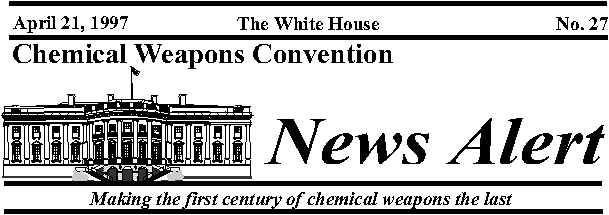|
Vil Mirzayanov, formerly a top official in the Soviet Union�s chemical warfare research center, called prompt
ratification of the Chemical Weapons Convention the key to confronting chemical weapons
programs worldwide. In a recent letter to Senator Richard Lugar, Dr. Mirzayanov, a former
treaty critic, wrote that he had studied the CWC and now considers it the best way to get at
covert programs.
Mirzayanov Expresses Strong Support
�Until last year, I was the favorite Russian of many critics of the Convention. I lost
their favor when I became one of the treaty�s most stalwart advocates.
�Having seen Russia�s chemical weapons complex from the inside, I am thoroughly convinced
that a ban on chemical weapons must be established and that the Convention is the vehicle to
accomplish that goal....
�In 1993 and 1994, my isolation and lack of understanding about the Convention�s provisions
led me to advise against the treaty�s ratification. At first, I did not fully appreciate
the Convention�s tough inspection measures, nor did I know that the treaty�s list of banned
and controlled chemicals can be expanded to keep pace with technical developments, such as
those that have occurred in the novichok [secret weapons development] program. After doing
my homework I became a staunch supporter of the Convention as the most viable way to bring
the novichok program, or for that matter, any other runaway chemical weapons development
program, under control....�
Bilateral Destruction Agreement Falls Short
�[Critics] have
argued that the situation in Russia would be better handled through a 1990 Bilateral
Destruction Agreement. This argument is truly flawed. The bilateral accord requires
Russia to destroy only the majority of its chemical weapons stockpile; the Convention
requires total elimination. The bilateral treaty has only routine inspections, but the
Convention also includes far more intrusive challenge inspections. Finally, Russia is not
the only country that has fostered or is now conducting a chemical weapons program. The
bilateral agreement can partly address chemical weapons problems in Russia, but it cannot
grapple with similar problems
|
elsewhere. The Convention is designed to reduce the threat of chemical weapons
worldwide.�
U.S. Crucial to Prompt Russian Action
�Senate ratification of the Convention is crucial to securing action on the treaty in
Moscow. On March 17th, President Boris Yeltsin presented the Convention to the Duma for
ratification, opening the door for the United States to exercise leverage. The Duma has
already held hearings on the advisability of ratifying the Convention. Noticeably, Russian
legislators have stated that lack of funding for Russia�s chemical weapons destruction
program is the single most important impediment to Russian ratification. In other words,
the Duma is reluctant to commit to the Convention�s 10-year deadline -- or even the
possible 5-year extension that Russia can request -- without knowing that Russia can pay
the bill for destroying its huge chemical arsenal. Perhaps more importantly, however,
astute observers of Russian politics understand that Moscow is loathe to have the
Convention enter into force on April 29th without Russian participation, especially if the
United States ratifies the treaty prior to that date. The Russian government does not want
America to dominate the Organization for the Prohibition of Chemical Weapons and the
important decisions that this body will soon be making about the Convention�s
implementation. My point is that U.S. ratification will have a significant impact on the
likelihood of Russian ratification. Yeltsin�s government can exert a great deal of
pressure on the Duma to act quickly. If the Senate ratifies the Convention now, Moscow
will have little choice but to do the same.
U.S. Leadership Needed Worldwide
�On the other hand, if the Convention flounders because the Senate does not ratify it,
Moscow will have ample excuses not to ratify the treaty. Moreover, the same individuals
who have thus far not proven their trustworthiness will continue to run Russia�s chemical
weapons complex. Thus, the key to confronting the chemical weapons problem in Russia and
elsewhere around the globe lies in the Convention. ... America must put its full weight
behind this international effort to abolish chemical weapons.� |


